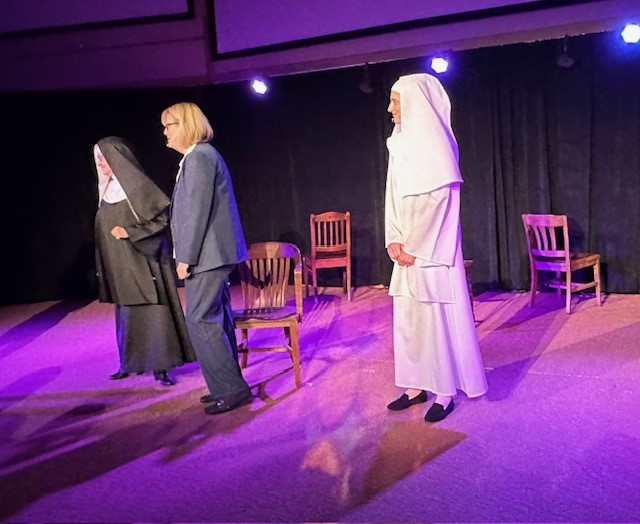
The Loma Linda University School of Religion’s Humanities Program sponsored Agnes of God, an award-winning drama by John Pielmeier, in March of 2025. This production marked the first performance of the 52nd annual Fine Arts Festival, presented by Loma Linda University Health.
Loosely based on the case of Sister Maureen Murphy, Agnes of God tells the story of a young nun, Agnes (Otinelis Iancu), who mysteriously gives birth to a baby later found dead in a wastebasket. Accused of infanticide, Agnes becomes the subject of an investigation led by psychiatrist Martha Livingston (Lynne Ennis), who is tasked with determining whether Agnes is legally insane or competent to stand trial. The convent’s Mother Superior, Miriam Ruth (Deborah Witherspoon McFatter), plays an integral role in the unfolding drama, firmly maintaining her belief in Agnes’s innocence.
As the play progresses, a striking tension emerges between faith and science. Mother Miriam, who steadfastly claims that Agnes’s pregnancy could have been a divine miracle, clashes with Dr. Livingston, who approaches the case through a rational, clinical lens. What unfolds is a layered exploration of faith, trauma, and the fragility of the human mind. The play also highlights the nuances of personal experiences with belief systems—how they shape, protect, and sometimes exploit individuals.
Brady Greer Huffman, the play’s director and co-producer, saw these themes as deeply relevant, particularly in today’s sociopolitical climate. In an interview, Huffman shared that his personal experience with religious trauma influenced his perspective on the play. “Growing up, I was part of a Southern Baptist community that was rather rigid, using guilt, fear, and shame as tactics to indoctrinate the youth,” he explained. A pivotal moment in his own life occurred when he expressed doubts about the Bible to a youth pastor, who cut him off mid-sentence and threatened to sever ties if he continued questioning. “I carried that moment with me for a long time,” Huffman said. His connection with actress Deborah Witherspoon McFatter, who plays Mother Miriam, further deepened his understanding. “Some of what she expressed were the very feelings I had deep within me but had never pinpointed as being rooted in my religious past.”
Huffman believes the play’s themes resonate today, particularly considering the rise in Christian nationalism. “This seems counter to Christian beliefs. Paul writes in Galatians 3:28, ‘There is neither Jew nor Greek, neither slave nor free, nor is there male and female, for you are all one in Christ Jesus.’ Nationalism places one's country over another. Christ creates equality, so must Christians strive for equality, even across nations.” In his view, Christian nationalism fosters inequality and exacerbates religious trauma, particularly for marginalized communities.
The performances in Agnes of God were gripping, each actor bringing depth and nuance to their role. Agnes, a victim of abuse, was raised by a mother who physically harmed and shamed her, intertwining religious extremism with suffering. Isolated in childhood, she was sent directly to the convent in her teenage years. Her mind was fractured—her innocence preserved yet deeply exploited. Agnes longs to be loved, yet no one has ever truly protected her.
Music played a pivotal role in the performance. Throughout the play, Agnes sings. Her ethereal voice, both beautiful and unsettling, underscores her fragile psyche. Her songs act as both a coping mechanism and a means of self-expression, seamlessly blending with the script’s themes of faith and suffering. The rhythm, syncopation, and tonality of her speech reveal a deep unease, reinforcing the ambiguity of her innocence and trauma.
Yet as the drama unfolds, it becomes clear that both Mother Miriam and Dr. Livingston are projecting their unresolved pain onto Agnes. Mother Miriam, estranged from her own children, appears to relive her maternal failures through Agnes. Dr. Livingston, burdened by the loss of her own child, unconsciously imposes her unfulfilled need for motherhood onto the young nun. Their battle is not truly about Agnes’s well-being; it is about proving the validity of their respective worldviews.
“For me, I wanted the audience to recognize the biases of both the Mother and Dr. Livingston and how, due to their trauma, their biases inhibited their abilities to see Agnes’s humanity,” Huffman shared.
The play’s conclusion is devastating. Dr. Livingston’s relentless pursuit of the truth leads to Agnes’s institutionalization, where she ultimately dies. The lingering question remains: Did the psychiatrist’s insistence on uncovering the truth serve justice, or did it merely strip Agnes of her last semblance of peace? Was Mother Miriam right to shield Agnes from painful memories, or was she complicit in perpetuating the silence that allowed abuse to persist?
Following one of the performances, the Humanities Program hosted a panel discussion featuring Dr. Mark Ard, a board-certified psychiatrist specializing in addiction medicine; Dr. Grace Oei, a pediatric critical care physician; Dr. Jamie Snyder, a professor of psychiatry; Dr. Kenneth Wright, co-director of the anatomy graduate program and co-producer of Agnes of God; and Brady Greer Huffman. The panel also included the three actors and was hosted by Dr. Zdravko Plantak. This allowed audience members to engage with the actors and a panel of experts, further exploring the play’s central themes.
The discussion was thought-provoking, delving deeper into the play’s themes. The panel and audience members also noted that Agnes of God critiques not just the Church’s failures—its tendency to conceal abuse, silence victims, and protect its own interests at the expense of the vulnerable—but also the failings of science. Historically, science has exploited marginalized groups in the pursuit of knowledge, and neither faith nor reason emerges unscathed in this narrative.
The performance was captivating, stirring thoughtful conversations, and challenging audience members to reflect on how their own biases and beliefs impact those in their care. Huffman expressed his gratitude to the School of Religion for supporting the arts, particularly live performances of such complexity and depth. Agnes of God is a story that lingers—a stark reminder of the tension between faith, trauma, and the fragile nature of human perception.
Article by: Ezrica Bennett
